
|

|
|
Between 200-100 B.C., The Celts Founded Creglingen And Farmed The Surrounding Plateaus And Valleys. Celtic Burial Mounds And Artifacts Have Been Found Near The Villages Of Frauental, Freudenbach, And Sechselbach. Creglingen Received Its Name During The Fourth Or Early Fifth Century From The Alemannic Prince Crago, The Crow. The Modern History Of Creglingen Begins In 1349 When It Received The Town Charter From German Kaiser Karl IV. |
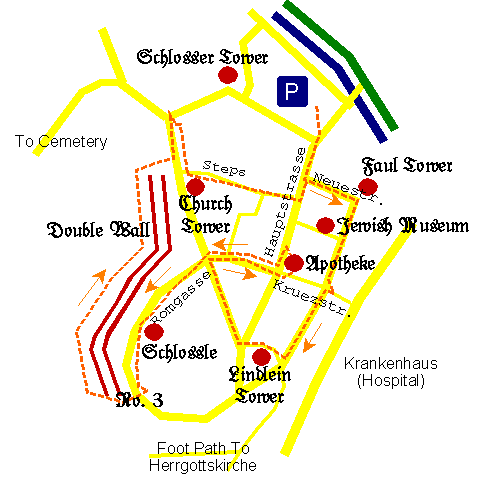 |
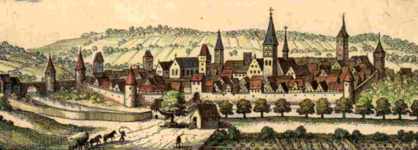 Medieval Town Of Creglingen |
 Schlosser Tower |
Start At The Creglingen Town Parking Lot Next To The River And The Sparkasse (Bank). The Tower Adjacent To The Parking Lot Is The Schlosserturm, One Of The Three Remaining Towers From The Middle Ages (In Medieval Times The Town Wall Had Fifteen Towers In All). Walk Along The Hauptstrasse (Main Street) And Take Your First Left Onto Neuestrasse. The Tower On Your Left Next To The Bistro Is The Faulturm (Prison Tower). It Is The Second Of The Remaining Towers. Today It Is Used As A Vacation Apartment That You Can Rent For About 25-30 EUR Per Night, An Interesting Experience But Not For Everyone (See The Lady In The Bistro For The Key). |
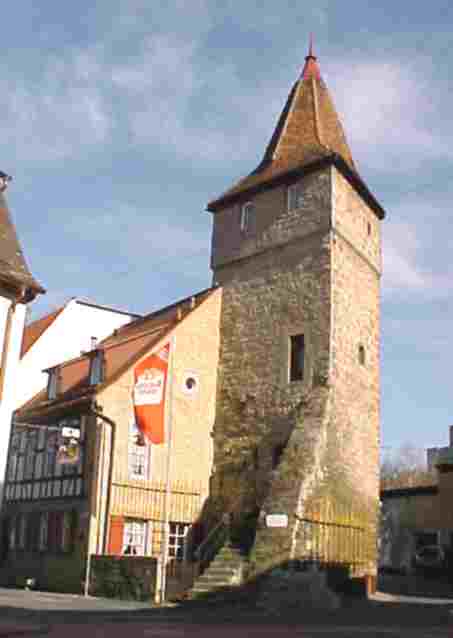 Faul Tower |
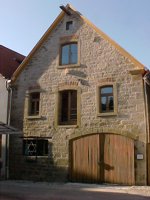 Jewish Museum |
Follow The Street As It Turns To The Right. After About 80 Meters You Will Cross Badgasse (Bath Street). In Former Times, The Jewish Womens' Bath Was Located On This Street. A Jewish Museum Recently Opened Here. The First Recorded Instance Of Nazi Violence Against A Jew Occurred In Creglingen On March 25, 1933. The Grave Of Arnold Rosenfeld Is Found In The Historic Jewish Cemetery About 1 Km Away. |
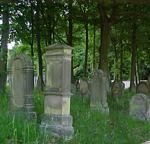 Jewish Cemetery |
 Medieval Stone Plaque |
In Medieval Times, The Corner Of Neustrasse And Kruezstrasse Was The Location Of One Of Three Doubled Towered Town Gates (Similar To The Gates Still Found Today In Nearby Rothenburg). It Was Called The Herrgottstor (Lord's Door) And It Led To The Herrgottskirche About 1 Km Down The Road. Today, Nothing Remains Except A Difficult-To-Read Stone Plaque Found In The Small Natural Stone Wall Diagonally Across The Street. |
|
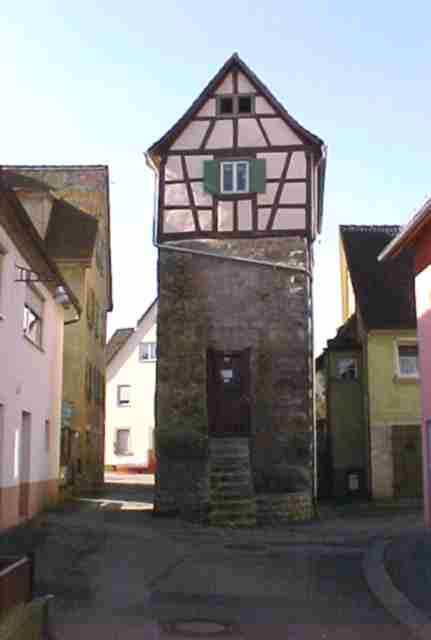 Lindlein Tower |
About 100 Meters Up The Narrow Stadtgrabenstrasse Is The Lindleinturm, The Last Of Creglingen's Three Remaining Towers. The Occupant Of The Tower, Margarete Böttiger, Died In 1995 At The Age Of 98. She Lived In The Tower For 66 Years. Her Tower Apartment, Just As She Kept It, Is Open To The Public. Take The Diagonal Lindleinstrasse. As You Walk Along, Look Up To The Left For A Good View Of The Recently Restored, Fifteenth Century Romschlössle. Note Also The Large Sign With A Key, The Former Shop Of A Medieval Lock-Maker. The Renaissance Door Arch Of The Large Fachwerk (Half-Timbered) House On Your Right Is Also Worth Seeing. |
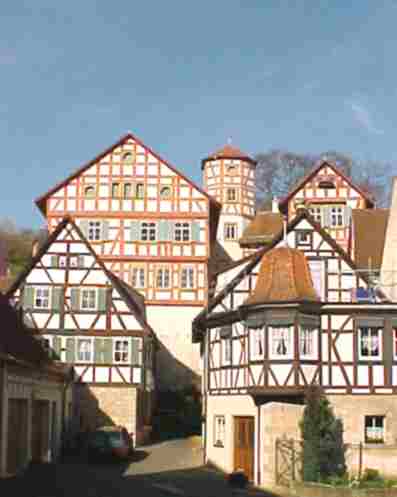 Romschlössle |
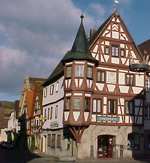 Historic Drugstore |
At The End Of The Street Turn Right And Walk Past The Rathaus (Creglingen City Hall) And Take A Look At The Old, Fach-Werk Apotheke (Drug Store) - In Continuous Operation Since 1712. Next To The Apothecary (On Hauptstrasse) Is The Town's Oldest Landhouse (Circa 1350). Today You Can Buy Fresh Flowers, Fruit, Vegetables, And Locally Pressed Juices While Enjoying The Old Beams And Stonework. If You Continue Down Hauptstrasse You Will Find A Bakery Where Bread Is Doubled Baked Like In The Old Days And A Shop With Meats, Sausage And Cheese. |
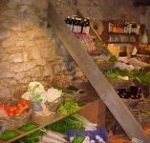 Medieval Shop (1350) |
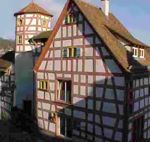 Town Library |
Now Retrace Your Steps Past The Creglingen City Hall And Turn Left Up Romgasse. Enter The Courtyard Of The Romschlössle Which Today Serves As The Town Library And Culture Center. Continue Up Romgasse Until You See The Obvious Sign With The House Number 3. A Tower Once Stood Behind The House. Turn Right And After A Few Steps You Will Find A Grass Path To The Right That Quickly Leads To The Remains Of The Medieval Town Double Wall. Take The Romantic, Moat Path Along The Bottom Of The Outer Wall And Note The Shooting Slits And The Round Holes For Cannon. Take The Steps At The End Of The Moat And Pause At The Lower Platform. |
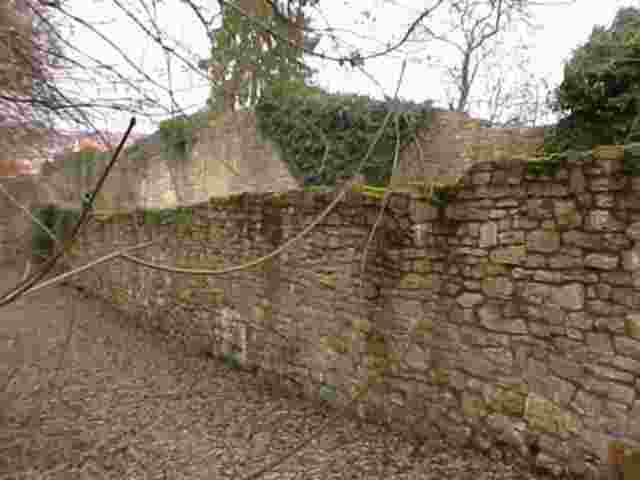 Medieval Double Wall |
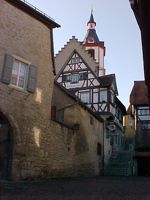 Church Tower |
On This Platform Once Stood The Tallest Tower In The City. The Keeper Would Blown His Trumpet at Noon, Ring the Bell At Night To Close The Work day, And Ever Watch For Fires. At Midnight He Would Place A Candle In The Tower Window So That The Citizens Could Sleep Reassured Of Their Safety. Across The Street You Will See The Town Church (Circa 1200) With Its Distinctive Tower. The Church Contains Pictures Of Creglingen Governors, Susanna Of Sechendorf and Portraits Of Apparently Important Gentleman. A Little To The Left You Will See The Sign Kirchenstaffel (Church Steps). Before Going Down The Steps Walk A Few Meters Up The Street And Look Down The Narrow Path That Runs Down The Hill, Past The Schlosserturm, Ending At The Parking Lot (Where You Probably Parked Your Car). The Houses Along The Street Are Built On Top Of The Medieval Town Wall. |
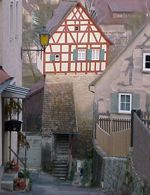 Narrow Street |
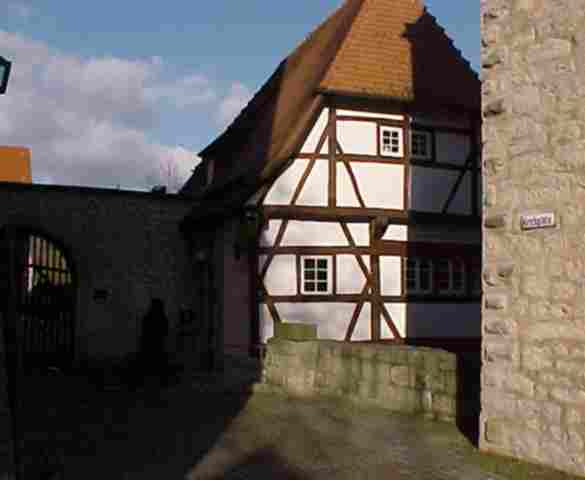 Oberkaplaney House |
Returning To The Kirchenstaffel, At The Top Of The Steep Steps Is The Oberkaplaney Haus Built In 1475 With Unique Alemannic Fach-Work (Half-Timbered Style). About Half-Way Down The Steps On The Right Is The Very Good And Tastefully Restored Schlossbäck Restaurant Which Served As The Castle Bakery In The 1800's. At The Bottom Of The Steps Is The Entrance To The Former Castle Courtyard And Now Days To Schlossbäck's Charming Terrace Cafe. |
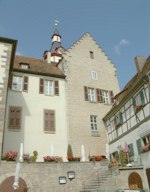 Terrace Cafe |